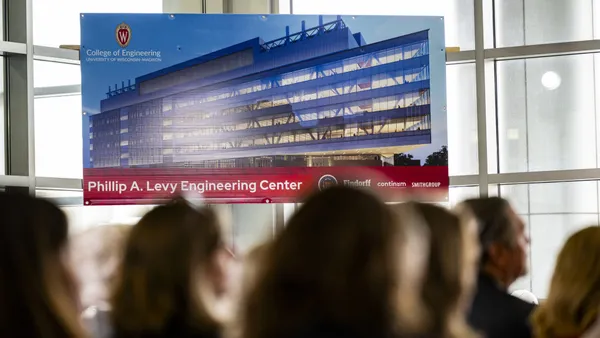Dive Brief:
- The Sacramento City Council voted Tuesday to amend its city code and adopt the contentious, according to The Sacramento Bee, Local Hire and Community Workforce Training Program, which requires contractors to use a 50% local workforce on most city-funded projects of $1 million or more.
- The program also requires that 20% of apprentices on covered projects be "priority apprentices," who live in economically disadvantaged areas or are veterans, prior offenders, recipients of public assistance, foster youths, homeless or women. The new ordinance also requires that 50% of the budgets for two major city projects, including the renovation of the Sacramento Convention Center, be spent with local businesses in certain counties and that 15% of those businesses be small, regional enterprises.
- In the sample agreement included on the city council's agenda is "Contractor(s) performing construction work on the project described in the agreement shall, in filling craft job requirements, utilize and be bound by the registration facilities and referral systems established or authorized by the local unions," a provision which some nonunion contractors argue will hinder their participation in city work. Proponents of the agreement, however, said that nonunion contractors perform around 60% of city work and that nonunion workers can simply register with the unions so that they can be included in the local hire program.
Dive Insight:
Unlike some other local hire mandates, Sacramento's gives contractors an out of sorts by allowing them to hire from any source if unions cannot provide them with the necessary workers within 48 hours of a request. On the other end of the spectrum was the Detroit workforce requirement for contractors performing services during construction of the Little Caesars arena. The city fined construction companies that didn't meet the 51% local hire requirements a total of $5.2 million. The Sacramento ordinance does not include such punitive measures for failing to meet the goals.
Labor shortages around the country make it difficult for contractors to adequately staff jobs, and restricting hiring to certain zip codes can put even more stress on companies that are already struggling to find enough workers. Nevertheless, more communities are insisting that their residents reap more benefits from taxpayer-funded projects.
To that end, Denver launched a pilot program that requires more local participation. Right now the requirement pertains to a $275 million site work contract awarded to Hensel Phelps for construction on the $1 billion National Western Center project, which is co-owned by the city and county. As part of the initiative, Hensel Phelps must hire a certain percentage of area residents that were formerly incarcerated, live in economically depressed areas or are veterans. The company must also perform community outreach about construction career and training opportunities.














